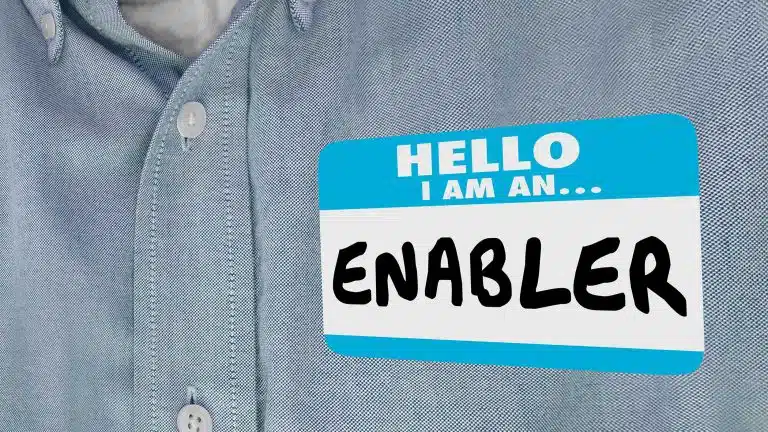When a loved one struggles with alcohol abuse, it can be hard to watch them deal with it. But it can also be difficult to know what the line is between supporting them and enabling their behavior.
Enabling describes behavior that allows your loved one to continue their self-destructive behavior. This enabling behavior can happen without you even realizing it, but here are ten ways to help you identify it and learn how to stop.
1. Bring Up The Issue
If you never bring up the issue with your family member or loved one, it may seem like you’re ignoring it or brushing it off and can make the problem worse.
Make it clear that you’re aware of their alcohol addiction. You can offer compassion and empathy but make it clear you aren’t condoning the behavior.
2. Encourage Them To Get Help
Once you make them aware you know they’re having issues with alcohol abuse, encourage them to get help and seek out an addiction treatment program. However, don’t force it on them—they have to want to get help for themselves.
You can bring it up multiple times, but ultimately, it has to be their decision. Otherwise, the help they do get may not stick.
3. Set Boundaries
Creating and maintaining healthy boundaries is one of the most important steps you can take. Tell your loved one you want to keep helping them, but not in a way that’s enabling their unacceptable behavior.
You may be okay with giving them a ride to an appointment, but not okay with lending them money. Or maybe you used to drink with them, but now you’re no longer willing to do so.
Besides setting boundaries, maintaining them is another important step. If you keep letting them cross a boundary you’ve set without any consequences, it’s not going to help either of you.
4. Say No
This may not be an easy thing to do, especially with a loved one, but saying no to things your loved one wants from you helps everyone.
Saying no ensures you’re not doing things you’re not comfortable with, protects your mental health, and puts the responsibility back on the person struggling with alcohol abuse.
If your loved one gets upset after you say no, remain firm. Saying no is a form of boundary setting and it’s important you stick to your guns.
5. Don’t Drink Alcohol Around Them
While you may not have trouble drinking alcohol, your loved one does, and being around someone who is drinking does not help their addiction. You can drink when they aren’t around, but limit yourself to non-alcoholic beverages when spending time with them.
If the person lives with you or spends time at your home often, it’s best to remove all alcohol from your home.
6. Support Recovery Efforts
Supporting your loved one’s addiction recovery efforts is vital. Everyone needs a support system, but people going through a recovery program need it more than ever.
Check-in with them as they go to meetings or therapy. Congratulate them on taking that big step and celebrate every milestone along the way.
7. Stop Rescuing Them
Whether your loved one got into legal trouble, hurt someone, or is late on a bill, you can’t rescue them from the consequences of those actions. It will only allow them to continue to deny that they have a problem and can quickly turn into codependency.
While it’s great you want to help, they need to face the consequences of their actions so they can see how much of a problem alcohol use is for them.
8. Don’t Make Excuses For Them
You also don’t want to make excuses for their behavior. It’s another thing that stops them from facing the consequences of their actions. The consequences might be harsh, but so are the ones that come with consistent alcohol abuse.
Whether you’ve made excuses for how much they drink or for something they did while drunk, it’s time to stop that enabling behavior.
9. Stop Taking Over Their Responsibilities
It’s important to not do things your loved ones could do themselves. If they don’t have a driver’s license and need a ride to an AA meeting, that’s fine because they can’t do that themselves.
But paying bills for them, cleaning their house, or getting their driver’s license back for them is something they can do themselves. It’s their responsibility and will likely only help them in the long run.
10. Go To Al-Anon Meetings
Try going to an Al-Anon meeting. Al-Anon support groups are for people who have someone in their lives with an alcohol problem. They can help you understand the disease and how you can help without being an enabler. You can also get support for yourself too.
If you or a loved one is struggling with substance abuse, please call our helpline today. We can assist you in finding the right treatment options for you.
Written by Ark Behavioral Health Editorial Team
©2024 Ark National Holdings, LLC. | All Rights Reserved.
This page does not provide medical advice.
Journal of Substance Abuse Treatment - Enabling behavior in a clinical sample of alcohol-dependent clients and their partners
Mental Health America - Co-Dependency
National Library of Medicine: PubMed - Enabling or Engaging? The Role of Recovery Support Services in Addiction Recovery
University of Pennsylvania - Enabling Behaviors

Questions About Treatment?
Ark Behavioral Health offers 100% confidential substance abuse assessment and treatment placement tailored to your individual needs. Achieve long-term recovery.
100% confidential. We respect your privacy.
Prefer Texting?
Our friendly support team is here to chat 24/7. Opt out any time.








 Learn More
Learn More








